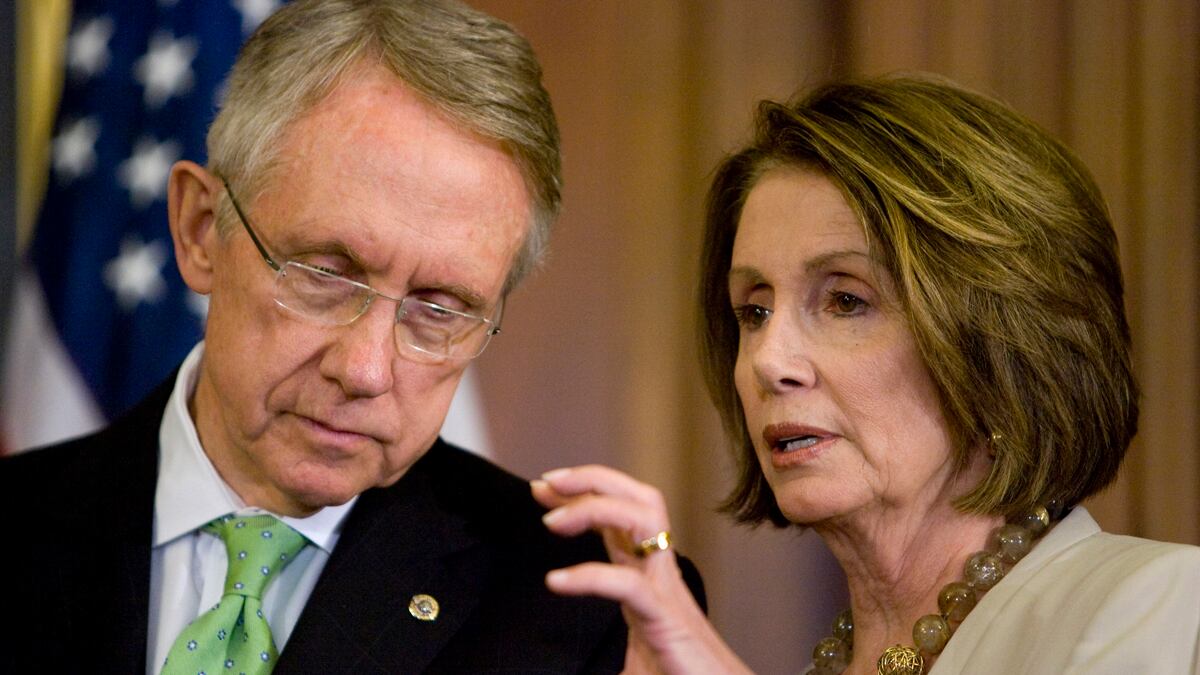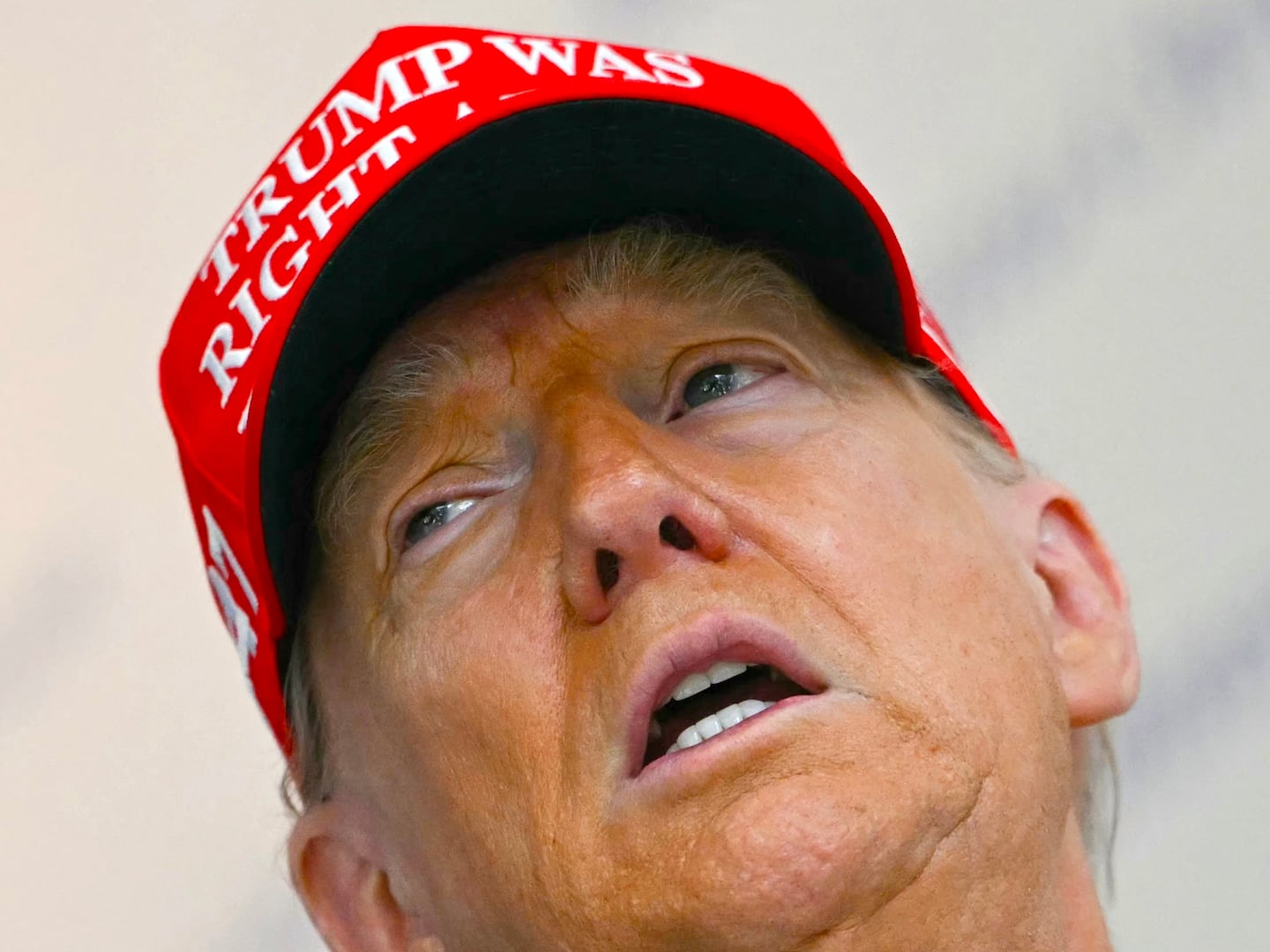On a steamy Sunday afternoon, accompanied by aides and surrounded by reporters, Democratic leader Harry Reid embarked on the short walk from the Senate side of the marble-floored Capitol to the House side to begin the tortured process with fellow Democrat Nancy Pelosi of cobbling together enough votes to avert defaulting on the nation’s credit.
Reid looked grim, his head slightly bowed as he strode purposefully, not saying anything, his visage adding to the drama. The impact of watching a small, raucous group of fiscal conservatives squeeze concessions over weeks of negotiation was evident in his look.
If the final debt deal is passed, it will look an awful lot like what the Tea Party wing of the GOP demanded. But that doesn’t mean Tea Party members will be happy or even vote for it—the final irony in a months-long drama that involved a game of chicken with the full faith and credit of the United States.
While much of Congress is upset at the prospect of downing such a bitter brew, the new political faction known as the Tea Party doesn’t abide any compromise, no matter the stakes for the country.
With just two more days on the debt clock, the machinations on Capitol Hill grew ever more surreal on Sunday. Reid’s initial compromise failed to get the required 60 votes to overcome a Republican filibuster.
Employing an arcane legislative maneuver, Reid then voted against his own bill in order to preserve his authority as majority leader to bring it up again in a modified form.
As the deal evolved with more than $2 trillion in cuts, equal to or more than the amount needed to extend the debt ceiling through the next election, and with no additional revenue, the clear winner was the Tea Party.
The newcomers held their ground, dictating the terms of the debate and extracting a historic victory in the scale of deficit reduction. Yet many who ran under the Tea Party banner could end up voting against it because it doesn’t go far enough.
These members’ refusal to back down on any new revenue, not even closing tax loopholes for special interests, took the nation’s economy to the brink. And it left some Democrats feeling like they had been extorted and wondering what the next demand might be.
It is a startling turn in how Washington works, with implications for President Barack Obama’s ability to govern, and with the potential to generate such outrage in the country that every elected official could be endangered next year.
Congress has seldom been a place for profiles in courage, and in today’s GOP, Republicans who don’t identify with the Tea Party keep their complaints to themselves and don’t stand up to their brethren on the right for fear of a primary challenge.
Now it’s up to the leaders in both chambers to find the sweet spot that can get the 218 votes needed in the House once Reid gets a rejiggered bill through the Senate.

After weeks of being stymied by the Tea Party, House Speaker John Boehner sought Sunday night to credit its members for many of the terms in the deal as he tried to cajole at least some to support it.
“Now listen, this isn’t the greatest deal in the world. But it shows how much we’ve changed the terms of the debate in this town,” Boehner told his troops in a private briefing. “There is nothing in this framework that violates our principles. It’s all spending cuts. The White House bid to raise taxes has been shut down. And as I vowed back in May—when everyone thought I was crazy for saying it—every dollar of debt-limit increase will be matched by more than a dollar of spending cuts.”
All the focus has been on what the Tea Party will accept, but now Democrats must be brought to the table. One of the “tweaks” under discussion is to allow the special joint congressional committee being created to identify a second phase of cuts to also recommend new revenue if it chooses.
Big deal, you can almost hear Democrats collectively say, but these are the kinds of blandishments that get deals done. Reid is a legislative warhorse, born to do this kind of wheeling and dealing that has been so disparaged but is necessary in a representative democracy. He has a kindred spirit in Mitch McConnell, the Republican leader, another veteran inside player, who has tussled with his Tea Party members in the Senate, but retains enough clout with the GOP caucus to deliver the needed votes.
The two men have engaged in this kind of political kabuki many times, but what’s different now is the presence of the Tea Party faction in the House that like a small child having a temper tantrum has held out for what it wants despite pressure from the Republican leadership, plummeting polls, and predictions of economic disaster should Congress fail to raise the debt ceiling.
“They govern by passion, not by their head,” says a former Republican leadership aide who did not want to be quoted seeming to disparage the Tea Party.
Half or more of the 87 freshman Republicans and their sympathizers in the GOP caucus will likely refuse to accept less than total victory and vote against what the leadership of both parties comes up with. The resulting vote, if the leaders bring it off, will be a hodgepodge of veteran Democrats and more traditional Republicans together with a sprinkling of Tea Partiers.
Ideally, half the Democratic caucus’s 193 members and half the Republican caucus’s 240 members will join forces in one of the more unpleasant pieces of business that Congress has faced in some time.
It goes well beyond bipartisanship into tri-partisanship because the Tea Party has established itself in its short life as a separate and more than equal force in the Republican Party.
Obama may gain a bit politically by isolating the Tea Party on the far right, but he has felt obliged to agree to a package that gives up critical investments so that even if the nation avoids default, there will be substantial spending cuts at a time when the economy can least afford them.
If the deal gets approved, the next debt-ceiling fight will have been put off until at least Thanksgiving, when the special bipartisan committee of Congress makes its recommendations for a second round of cuts.
The Tea Party has been emboldened, and it will likely make more demands once the appropriations process gets underway on Capitol Hill.






